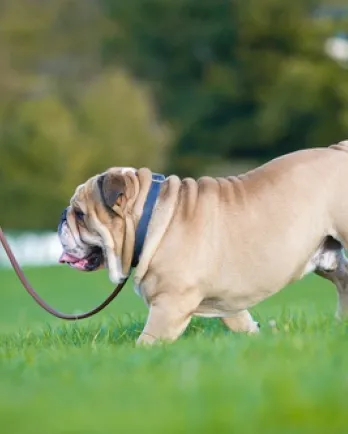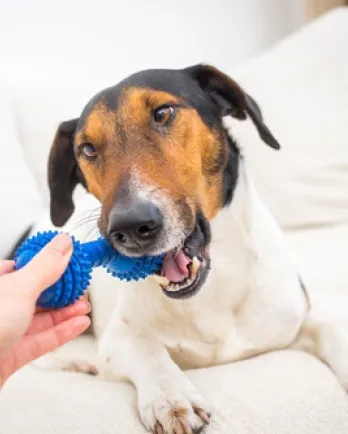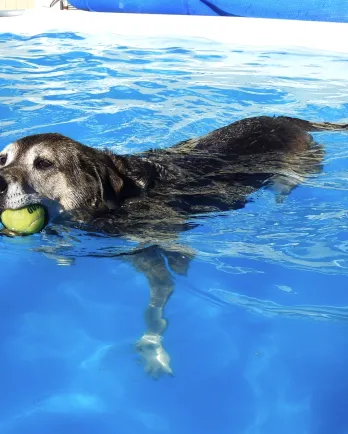Keeping Your Senior Dog Active
Increased time spent sleeping is common with senior dogs. An old dog may seem content to sleep the day away, getting up only to go outside to the bathroom or for meals. However, while they may not be able to handle a vigorous hike like they used to, older dogs should still engage in regular activities that stimulate their body and mind. Some activities such as training sessions and therapeutic exercises are particularly useful for helping dogs adapt as they age.
As with our own bodies, exercise benefits old dogs in many ways, keeping muscles toned and minds clearer. Making the time for even a gentle walk around the block every day will keep the muscles from atrophy, and the sights and smells will keep an old dog’s mind stimulated and engaged in the world around her.
Be sure to keep your dog on leash or within your sight if you take her to the park, on an easy hike, or even on your own property. Hearing loss is very common as dogs age and your dog may not realize you’re calling her. Old dogs can easily become disoriented in unfamiliar areas, and with a loss of hearing or diminished sight, can wander too far without meaning to and become lost.
Don’t be disappointed if your older dog is not interested in the same activities that she enjoyed as a youngster—you’ll enjoy exploring new activities appropriate for her age. For example, off-leash dogs parks are very popular, but your older dog may not enjoy the rough-and-tumble play of the younger dogs. Certified Pet Dog Trainer (CPDT) Robin Bennett, co-author of the book Off-Leash Dog Play: A Complete Guide to Safety and Fun, recommends off-leash parks as most appropriate for dogs three years of age and under. Of course, this is just a guideline and you should consider your dog’s temperament and abilities.
For some dogs, the social aspect of going out may still be important, says expert dog trainer Mikkel Becker. Even if the dog park is no longer an option, you might want to take your dog for a visit to a coffee house or pet store.
For dogs that are not as social, Becker suggests stimulating their minds by including game scents in their toys or simply adding variety to their play sessions. "Place a small portion of your pet's meals in food puzzles that can be rotated on a regular basis, or scatter kibble in the yard for your dog to find using his nose. Rotate toys frequently to help prevent boredom. Play new games with your pooch to keep him busy and encourage interaction."
Training sessions are another activity that an older dog may benefit from and enjoy. Positive training can be a bonding experience and fun for both you and your dog. If you have just adopted an older dog, some brush-up (or maybe totally new) training sessions are a great way to establish a healthy relationship.
Cecily Joque is a CPDT who loves to teach dogs of all ages, and she believes that some of her best students have been older dogs. “Old dogs CAN learn new tricks!” she emphatically states. “First, find what motivates your older dog. If they like a certain kind of treats, that can be a big plus, but some older dogs are motivated by attention, affection, and even play sessions with their favorite toys.” Your older dog's ease of training and eagerness to please might surprise you!
Extra treats used for training can cause weight gain, so using food for motivation should be monitored and regular meals adjusted accordingly. Also, Cecily recommends a vet check before class starts. “If a dog is uncomfortable with a particular position or movement due to pain, it is not something that they will enjoy doing, and training will be frustrating for both of you.”
Many older dogs love to engage in learning and enjoy the attention from you as well as the social aspect of dog training classes. Training activities can also help you and your dog adjust to new care practices as she ages. You may, for instance, need to train your dog to use a ramp or accept ongoing medical or health maintenance treatments.
Even dogs with hearing loss can be taught readily with hand signals instead of voice commands. Mikkel Becker suggests, “Invent your own signals or use American Sign Language to teach your dog words like dinner, walk, car, bedtime and outside.” You can read more of her tips for training a hearing impaired dog here.
Training is not the only activity that can both prove stimulating for your dog and help your dog adjust to aging. For instance, you might want to incorporate therapeutic exercises such as swimming or walking on an underwater treadmill. Martha Pease, trainer and physical therapist, writes, “[Hydrotherapy] has many benefits for all dogs, but can have an especially dramatic effect on senior dogs, providing a painless, fun means of exercise and movement. The water provides buoyancy, which diminishes the stress on the joints, allowing the dog to move without pain.”
Don't forget that although your dog is slowing down, she still needs to be engaged mentally and physically. If you pick the right activity, it will help your dog have a happier and healthier old age.
For more information, don't forget to check out: http://www.greymuzzle.org/Grey-Matters/September-2014/Teaching-Old-Dogs-New-Tricks-with-Mikkel-Becker.aspx
The information presented by The Grey Muzzle Organization is for informational purposes only. Readers are urged to consult with a licensed veterinarian for issues relating to their pet's health or well-being or prior to implementing any treatment.
This article includes an excerpt from Grey Muzzle's free guide Caring for Your Senior Dog. Caring for Your Senior Dog was developed in collaboration with a leading veterinarian in geriatric medicine, a clinical nutritionist, and other experts in senior dog care. The entire guide is free to download.
The Grey Muzzle Organization improves the lives of at-risk senior dogs by providing funding and resources to animal shelters, rescue organizations, sanctuaries, and other nonprofit groups nationwide.





